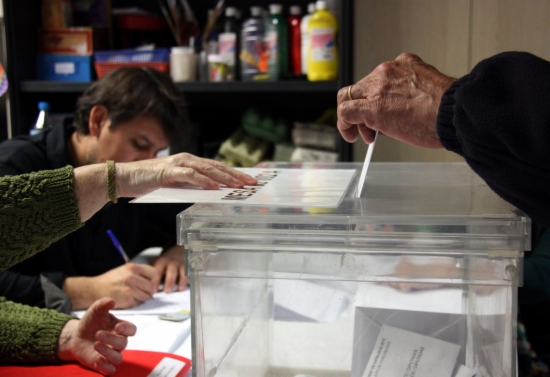30.04.2014 - 15:26
The latest polls organized by the Catalan government find that 47% of the entire body of voters would vote Yes-Yes on the November 9th referendum on independence. According to the data made public today, a Yes answer to the first question (Do you want Catalonia to become a state?) would win 57,6% Yes votes and 19,3% No votes. In the second question (Do you want that state to be independent?) in which only those who had voted Yes would answer, the Yes answer would receive 81.8% of the votes; together that makes up 47% of the entire census. The No answer to the second question would only receive 8.6%. Only one in ten polled remain undecided. 11% said they wouldn’t vote at all.
However, it’s important to point out that while 47% would vote Yes-Yes, the other 53% is divided between undecideds, abstentions and no votes. So, there’s 47% for Yes-Yes, 19.3% for No, 11.5% for Yes-No, 11.5% abstentions and 11,2% undecided. Plus 0.9% who would vote blank or null. Of course, final results are calculated without abstentions. Even assuming that all of the undecided ended up voting No or Yes-No, which is a lot to assume, the Yes-Yes still wins with 53% of the vote (47%/88.5%—that is, the total Yes-Yes, minus the abstentions), No’s, Yes-No’s, and Undecided-to-No’s get just 47.4% (19.3% + 11.5% +11.2% / 88.5%), and there would still a tiny amount of blank and null votes.
If undecided are not counted at all, (or are divided evenly) the Yes-Yes vote rises to 61% (47% / 77.3%, that is, Yes-Yes over the total minus Abstentions and Undecideds), while No’s and Yes-No’s would get 39.8%.
This is the first time that the CEO publishes a poll that includes a direct question about the November 9th referendum.
CiU would win the elections with ERC at a close second
With respect to the elections to the Parliament of Catalonia, CiU would win once again, but would lose some 14 seats, for a balance of between 35-46. It would have ERC close at its heels with 34-35 seats, fourteen more than presently. According to the CEO, the PSC, ICV-EUiA, and Ciutadans would all win between 14-15 seats, the CUP would get between 7-9 and the PP would fall to 11 or 12.
CUP beats out PSC in direct vote intention
When quantifying people’s direct intention to vote, CUP would earn third place, in front of PSC. So, if elections were held tomorrow for the Parliament of Catalonia, 20% would vote ERC, 14,5% would vote CiU, 6.4% for CUP, 6.1 for PSC, 5% ICV-EUiA, 4% for Ciutadans, and 1.6% for PP. These figures don’t transfer directly to percentages in the Parliament due to territorial questions. For example, you need fewer votes in less populated provinces than you do in the city (or province) of Barcelona.
David Fernàndez is the highest valued political leader
With respect to out political leaders are valued, CUP MP David Fernàndez gets the highest marks (5.47 out of 10), followed by Esquerra’s Oriol Junqueras (5.45) and Josep Maria Terricabras (5.29). In 4th and 5th place, with grades below 5, there is ICV’s Joan Herrera (4.94), and CiU’s (President) Artur Mas (4.75).
Most PSC voters believe that an independent Catalonia will have the same level of social cohesion
More than 60% of PSC voters believe that if Catalonia becomes independent, Catalan citizens will get along together pretty much the same or better as now. Specifically, 39% of PSC voters believe people will get along the same and 9.6% believe people will get along better. On the other hand, 38.8% believe it will be harder to get along, 10.9% don’t know and 0.8% didn’t answer. Across all Catalans, and not just PSC voters, 46% that social cohesion will not change, 22% believe it will improve, 20,4% believe it will deteriorate, and 10.9% didn’t answer.
By party, the percentage of voters who believe that social cohesion will stay the same as now there are 56.6% of ICV voters, 52.1% of CiU voters, 50.5% of ERC. Esquerra and CUP voters are the ones who believe that social cohesion will improve with independence: 40.2% of Esquerra and 36.2% for CUP. Most PP and Ciutadans supporters believe that it will be harder to get along.
CiU and ERC would tie in the European elections
With respect to the European elections, Esquerra is forecast to receive 20.1% for the EU elections, a tenth more than CiU (20%). PSC would get 16.9% of the votes, PP 12.1% and ICV-EUiA 11.3%. Ciutadans could win as much as 9.9% of the votes and UpyD 2.2%. The estimated turnout is about 42%, five points higher than in 2009.
Most Catalans see the “third rail” option as hardly possible or not likely at all.
65% of Catalans think the “third rail” option is improbable: 31.5% believe it is “hardly possible” and another 33.2% think it’s “not likely at all”. By parties, most voters of CiU, ERC, ICV-EUiA and the CUP consider it “hardly likely at all”. 24.9% of PSC voters, in contrast, find it “fairly possible” and 35.8% find it “hardly possible”.



